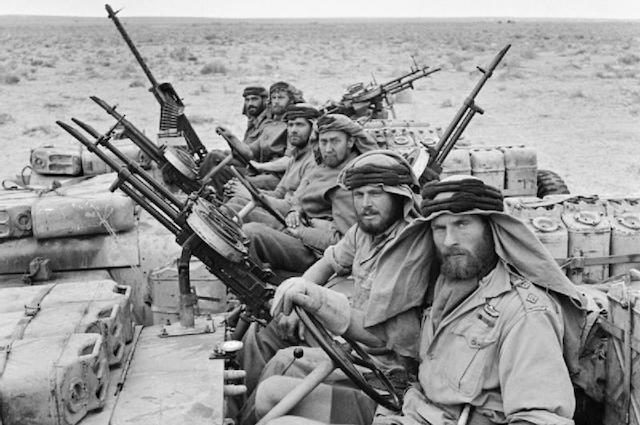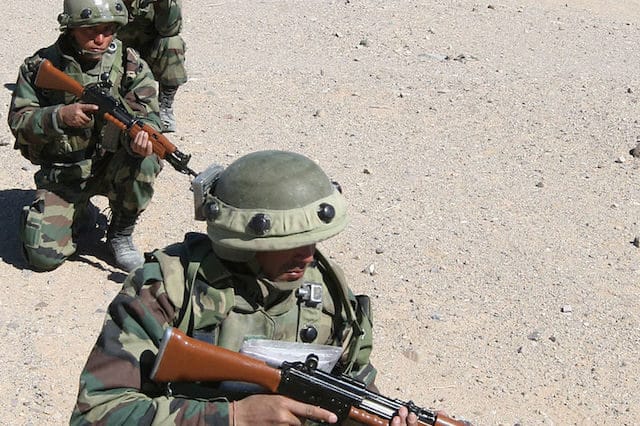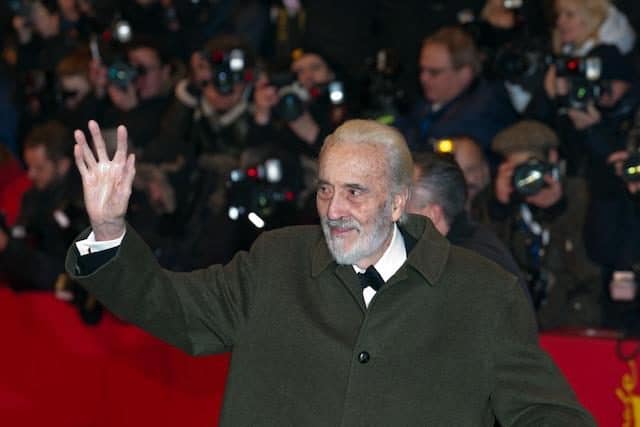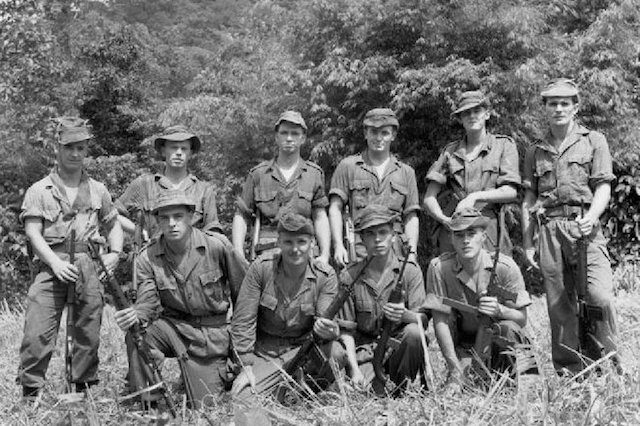The United Kingdom’s special forces are not necessarily quite as well known as some of the United States special forces, and are often not as lauded around the world, but this is not because of lack of competence. The truth is that the United States tends to more heavily advertise it’s military in popular culture, and is known for being a bit flashy, whereas the British quietly do what needs to be done, and make less of a big deal about it.
Most people spend their time applauding the SEALs or other American units, but the major British special forces, such as the Special Air Service and the Special Boat Service, not only predated American special forces, but also inspired many of them to be what they are today. Without the inspiration of the SAS, a regiment known for one of the most grueling selection trials in the world, we likely wouldn’t have most of the modern special forces around the world that we have today.
10. The SAS Was Only a Detachment of the Army During WW2 and Was Initially Disbanded

The Special Air Service, commonly called the SAS, are now synonymous with the best of the best of the British military, and are something that most in the UK couldn’t imagine living without. However, there was a time when they were not considered nearly as important as they are today. They were founded as a regiment of the army known as L Detachment, a code name meant to fool the Germans, and were tasked with the kind of missions you would expect elite commandos to be asked to undertake. Surprisingly, after the end of World War II, the powers that be in the British government saw fit to disband the burgeoning SAS entirely.
However, just about one year after the SAS was disbanded, they were reformed as a new regiment, since the government realized that having an elite commando squad around was actually a very good idea on a long term basis. The need was in fact so great that over the years, more regiments have been added to the SAS to expand their size and capabilities. It seems that disbanding them even shortly was likely a mistake, however, it is an understandable one. After World War II many nations were trying to focus their efforts on rebuilding, and not necessarily on ramping up defense spending.
9. The UK Have Their Own Version of the Navy SEALS Called the Special Boat Service
https://www.youtube.com/watch?v=v9pA4I606No
Those who are from the UK will not be surprised by this, but many Americans may not realize that the British have their own version of the Navy SEALs, an elite Special Forces unit that is especially adept at swimming, boating, and anything that involves water at all – although like the Navy SEALS, they are adept at operations in any climate or terrain. Many Americans may be surprised to know that it was not the US that inspired the British, but likely the other way around, as the Special Boat Service predates the United States Navy SEALs.
The Special Boat Service holds its roots in the days of World War II, where the antics of a daring British commando gave rise to an entirely new unit that exists to this day. The legends say a British commando named Roger Courtney was trying to convince his superiors of his excellent way to sneak across the water undetected to get to enemy territory. They weren’t listening to his idea, so he actually snuck onto a nearby British ship – the HMS Glengyle – stole a gun cover from the deck, and cheekily wrote his initials on the captain’s door. He then presented his findings to his superiors, who decided that he needed his own men to command, and it was from these snarky and daring beginnings that the Special Boat Service was born.
8. The Special Air Service Became Increasingly Involved in the Troubles in Northern Ireland
https://www.youtube.com/watch?v=PAxOwJjoGXI
It’s always controversial when actual military units are engaged in civilian matters in the homeland, even when it is terrorist related. Usually the police or intelligence and other agencies deal with such situations, but as the troubles in Northern Ireland got worse, the SAS was actually called in to help with the situation. At first it started with them only advising regular units, but as time went on, their involvement increased. They abducted several IRA leaders from their homes, and dumped them across the border so that they could be formally arrested.
In multiple embarrassing incidents, cars full of SAS soldiers actually accidentally ended up going across the Irish border and were arrested by Irish police, which was a political nightmare. Unfortunately, things eventually went from a little wacky and heavy handed to tragic. On multiple occasions innocent bystanders ended up gunned down due to the heavy handed tactics of the SAS. This is not to fault them specifically, but perhaps the government did not make the best decision to employ Special Forces trained for fighting wars to deal with domestic terrorism and unrest. It should also be said that despite their reputation, the SAS were remarkably restrained, and there were only a handful of actual civilian casualties over the course of their involvement in the troubles.
7. The SAS Selection Process is So Tough Some Have Died Attempting It
There are many very elite special forces units throughout the world, and many of them would argue about who is better at what, or who, overall, is the most well trained. However, the SAS arguably has, at the very least, the toughest final selection process to get through. Military special forces tend not to tell the public all the details, but what has been told to the public is insanely rigorous. It involves a 26 mile endurance march near Wales, while carrying heavy gear, often in harsh weather. Even passing this alone is not enough, as those who are looking to join later have to also pass an endurance march in the jungles of Belize.
The selection process actually lasts for sixth months of grueling training exercises, and has about a 10% pass rate. Keep in mind that the people who sign up to attempt the selection process are generally already soldiers at the peak of their physical fitness. In fact, the process is so grueling that it came under fire a few years ago when three recruits died during a training march from the brutality of the conditions. The grieving parents accused the SAS of having a “culture of death” and felt that they did not do enough to prevent the death, and encouraged people to push themselves too far past their own limits.
6. During the Early Days of Iraq, Former SAS Members Found Lucrative Work as Bodyguards
During the early days of Iraq, right after the government was toppled, many people thought that the area was now safe. President Bush had declared that Iraq was now free and we had won, and many people felt that if nothing else, we only had mopping up action left to do. However, the truth was much, much more complicated, as we all soon learned. Sectarian violence became a big issue immediately and various terrorist groups started trying to take advantage of the chaos. Each sectarian group wanted to control the government and persecute the other groups.
However, the American government, despite the chaos, had a responsibility to rebuild the mess that it had left. This meant there was a need to hire all kinds of contractors, experts, and businessmen to help with the rebuilding. Unfortunately, many of these people would not come despite their employers urging unless their company paid for bodyguards, as many described Iraq as being like the “Wild West.” Many of the more important or richer businessmen, or those contractors who were working for richer companies, sometimes had a cadre of multiple bodyguards. And some of the richer individuals simply paid for their own, as almost everyone was now on their own for protection, with no proper governmental structure. Former members of the SAS quickly found themselves offered very lucrative work opportunities to act as bodyguards in Iraq, some of them getting paid as much as 1,000 pounds a day for their work. When the rich in Iraq were looking for bodyguards, British Special Forces commanded a very premium price and were highly sought after.
5. Recently a Dozen Gurkha’s Made Their Way Into the SAS

The Gurkhas, for those who don’t know of them, are an elite fighting unit hailing from the country of Nepal. Way back in the days of the East India Trading Company, the British came upon these fierce fighters and despite having a numerical advantage, quickly found themselves on the back foot. Before long, they had put together a peace treaty with the Gurkhas, and convinced them to now join them in their campaigns around the world. Since then the Gurkhas have fought bravely alongside the British, proving their mettle time and time again.
They may not be technically designated as Special Forces; however, they are incredibly elite. Roughly 28,000 Nepalese men compete every year to join, but there are only 200 spots to fill in the Gurkha regiment of the British army, and the standards and selection process are incredibly harsh. The Gurkha have a long held tradition, that is sometimes still practiced to this day, of using their traditional knife known as the kukri to behead their enemies when they need evidence of a kill. Nowadays, this is really overkill when it comes to proof, as a DNA sample does not need an entire head.
It was also recently confirmed that a dozen Gurkha now serve with the elite SAS regiment, out of about fifty that have attempted the selection process in the last few years. This is actually quite impressive, as that is an almost 25% pass rate, whereas the test itself is largely attempted by British soldiers, and has an overall pass rate of about 10%.
4. Sir Christopher Lee May Have Exaggerated His Exploits in World War II

Sir Christopher Lee is an acting legend, and there is no doubt that he served honorably during World War II. However, a historian has recently questioned whether he actually served with the SAS, or did anything particularly crazy behind the scenes of battle at all. According to historians who looked at his record, Lee actually served with the RAF as a liaison between them and the Special Forces, such as the early SAS. However, there is no evidence that he was ever formally part of the SAS, and much less evidence that he was involved in the kind of cloak and dagger active duty combat operations that many people think.
Some more fantastic claims have suggested he was even sneaking behind enemy lines destroying planes, which is not really backed up by anything. To be fair to Lee, though, he didn’t really lie, although he may have exaggerated a little bit. He only said that he was with the SAS, and this is partially true since he liaised with them. And while he claimed he couldn’t talk about the past, even though some did with no repercussions, this also means he didn’t go around making up stories of things that didn’t occur. And while some historians may find some holes in his story, it doesn’t necessarily mean that Sir Christopher Lee was never involved in any combat at all. He was quite insistent when filming The Lord of the Rings, that Peter Jackson needed to be coached on how someone actually sounded when they were stabbed in the back.
3. The SAS Rocketed to International Fame After Their Role in the Iranian Embassy Siege
The SAS were already a very important special forces regiment, and were very well distinguished and skilled, but they were not quite as well known or lauded on the international stage during their first few decades. As they had only been a small unit during World War II, many people in other countries did not know much about them, or their skills, when the 1980s rolled around. It was in the year 1980 that several members of an extremist political group from Iran stormed the Iranian embassy in London and took 26 innocent people hostage. They demanded the release of nearly 100 of their imprisoned political allies, and wanted a plane so they could take the hostages with them to ensure their plane wouldn’t be targeted as they escaped.
Margaret Thatcher, then the Prime Minister, did not believe in negotiating with terrorists and after six days of intense standoff, it seemed that the situation was not going to go anywhere good. Negotiations would likely involve having to get several other countries involved, and time was running out with the terrorists threatening to kill all the hostages or blow up the building if they did not get their way very quickly. When the terrorists shot a couple of the remaining hostages, Thatcher decided enough was enough, and called in the SAS, who had been waiting nearby, to storm the building. They managed, with just the cover of tear gas grenades and pure skill and daring, to rescue all of the remaining hostages without any harm to them, and even took some of the terrorists alive for questioning. This incident has forever cemented their reputation as one of the most elite special forces in the world.
2. Back in the Early Days of the Iraq War, the SAS and SBS Had a Nasty Public Row
https://www.youtube.com/watch?v=abHa-Pr13gA
During the early days of the Iraq War, the SBS and SAS had a bit of a debacle, where the head of Special Forces had to come down and tell everyone to stop talking down to other branches, as it impugned the honor of both. It all started with a newspaper article where a former SAS member had said all kinds of insulting things about the SBS, which briefly ignited a fire between the two that is normally kept to the level of a friendly and professional rivalry. The article suggested that SBS members are not professional, and the former SAS member claimed that he refused to even work with them because of that fact.
He also claimed that SBS members do not go through jungle training in Belize like the SAS do, which is simply not true. He claims that they are cowards, and points to a situation where they were attacked by 300 Iraqi Republican Guard, and he says they ran away in fear. An anonymous SBS member fired back that the situation was being put forth wrongly, and tried to set the record straight. He claims that the unit was led into a trap by local guides who were actually spies for the enemy, and that despite that and being significantly outnumbered, the SBS managed to fight their way out with only one casualty. The SBS had also been upset at the time that a lot of operations they pulled off were being reported in the media as being completed by the SAS, which only made tensions worse.
1. A Few Years Back an Incredibly Detailed Diary of the Original SAS Exploits Was Republished

Many of the details of the early SAS were simply not recorded at all, mostly for good reason. It was the middle of a war, and it was a Special Forces operation, so things were rather secretive, and most people were primarily concerned with stopping the Nazis. However, one anonymous member of the SAS kept a lot of original documents, pictures, and all sorts of incredible information about the early days of the SAS, and kept it in a diary. When the war ended, he simply kept it in his house, never showing it to anyone or bothering to mention that he had it. Shortly before his death in the 1990s, he decided that he should make sure it ended up in the right hands, and gave it to the SAS Regimental Association.
The Association kept it, but for many years didn’t actually go through it properly or realize what they had. Only more recently when a documentary filmmaker was going through their old files, he found the diary and realized just what a treasure he had stumbled upon. A few years ago, a limited amount of copies were republished with the proceeds going mostly to the SAS Regimental Assocation to continue their historical preservation work. It will likely be republished again someday, and perhaps over time the information will become more widely printed on the internet and readily available for everyone to see the history of the early days of the SAS.
5 Comments
The SAS
I wonder how the SAS measures up to JTF2?
Entirely different missions. About like comparing apples to oranges. A US Army SF ODA is a better comparison.
Yes the SAS is Great and one of the Best with certainly the best pedigree of all the worlds Special Forces!
SAS is the BEST Special Forces Unit in the World!